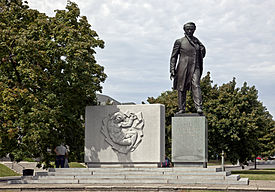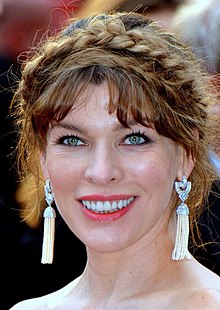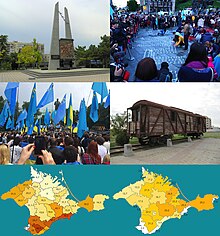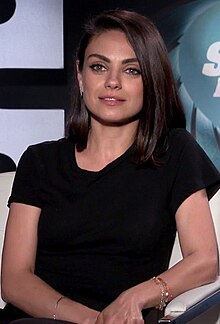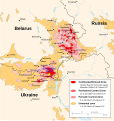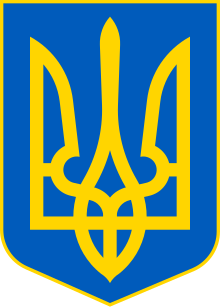Portal:Ukraine
The Ukraine Portal - Портал України
Ukraine Україна (Ukrainian) | |
|---|---|
| ISO 3166 code | UA |
Ukraine is a country in Eastern Europe. It is the second-largest European country after Russia, which borders it to the east and northeast. It also borders Belarus to the north; Poland and Slovakia to the west; Hungary, Romania and Moldova to the southwest; with a coastline along the Black Sea and the Sea of Azov to the south and southeast. Kyiv is the nation's capital and largest city, followed by Kharkiv, Dnipro, and Odesa. Ukraine's official language is Ukrainian.
During the Middle Ages, Ukraine was the site of early Slavic expansion and the area later became a key centre of East Slavic culture under the state of Kievan Rus', which emerged in the 9th century. The state eventually disintegrated into rival regional powers and was destroyed by the Mongol invasions of the 13th century. The area was then contested, divided, and ruled by a variety of external powers for the next 600 years, including the Polish–Lithuanian Commonwealth, the Austrian Empire, the Ottoman Empire, and the Tsardom of Russia. The Cossack Hetmanate emerged in central Ukraine in the 17th century, but was partitioned between Russia and Poland, and absorbed by the Russian Empire. Ukrainian nationalism developed and, following the Russian Revolution in 1917, the short-lived Ukrainian People's Republic was formed. The Bolsheviks consolidated control over much of the former empire and established the Ukrainian Soviet Socialist Republic, which became a constituent republic of the Soviet Union when it was formed in 1922. In the early 1930s, millions of Ukrainians died in the Holodomor, a human-made famine. The German occupation during World War II in Ukraine was devastating, with 7 million Ukrainian civilians killed, including most Ukrainian Jews.
Ukraine gained independence in 1991 as the Soviet Union dissolved, and declared itself neutral. A new constitution was adopted in 1996. A series of mass demonstrations, known as the Euromaidan, led to the establishment of a new government in 2014 after a revolution. Russia then unilaterally annexed Ukraine's Crimean Peninsula, and pro-Russian unrest culminated in a war in the Donbas between Russian-backed separatists and government forces in eastern Ukraine. Russia launched a full-scale invasion of Ukraine in 2022. Since the outbreak of war with Russia, Ukraine has continued to seek closer ties with the United States, European Union, and NATO.
Ukraine is a unitary state and its system of government is a semi-presidential republic. A developing country, it is the poorest country in Europe by nominal GDP per capita and corruption remains a significant issue. However, due to its extensive fertile land, pre-war Ukraine was one of the largest grain exporters in the world. Ukraine is considered a middle power in global affairs, and the Ukrainian Armed Force is the fifth largest armed force in the world in terms of both active personnel as well as total number of personnel with the eighth largest defence budget in the world. The Ukrainian Armed Forces also operates one of the largest and most diverse drone fleets in the world. It is a founding member of the United Nations, as well as a member of the Council of Europe, the World Trade Organization, and the OSCE. It is in the process of joining the European Union and has applied to join NATO. (Full article...)
In the news
- 19 November 2024 – Russian invasion of Ukraine
- Attacks in Russia during the Russian invasion of Ukraine
- Ukraine launches ATACMS ballistic missiles at targets in Bryansk Oblast, Russia, according to the Russian Defence Ministry. It is the first time that Ukraine has used the American-supplied missiles to strike targets inside Russia. (BBC News)
- German Taurus controversy
- German opposition politician Florian Hahn condemns German Chancellor Olaf Scholz's refusal to grant long-range Taurus missiles to the Ukrainian military as putting party interests above foreign policy. (The Kyiv Independent)
- Nuclear risk during the Russian invasion of Ukraine, Russia and weapons of mass destruction
- Russian President Vladimir Putin signs a decree that allows Russia to use nuclear weapons in response to conventional attacks by a non-nuclear state supported by a nuclear power. (Reuters)
- The United Kingdom and France both prepare new military packages containing long-range missiles to send to Ukraine following United States President Joe Biden's decision to allow deep strikes into Russian territory using American weapons. (Newsweek)
- 18 November 2024 – Russian invasion of Ukraine
- Russian strikes against Ukrainian infrastructure
- Odesa strikes
- Russian forces launch a missile attack on the city of Odesa, Ukraine, for the second consecutive day, killing at least ten civilians, injuring dozens of others and damaging civilian infrastructure, including residential buildings. (Ukrainska Pravda)
Featured pictures
Did you know (auto-generated)

- ... that Sarah Ashton-Cirillo, covering the Russian invasion of Ukraine, said that Ukrainians care less about her being transgender than Americans do?
- ... that the 1885 spiritual anthem Prayer for Ukraine was performed by a choir from New York on Saturday Night Live?
- ... that Ukrainian designer Anna October showed her collection during Paris Fashion Week after escaping the 2022 Russian invasion of Ukraine?
- ... that more than 200 Nobel Prize laureates have signed a letter against the war in Ukraine?
- ... that a Ukrainian soldier has written a song dedicated to the Turkish combat drone Bayraktar TB2?
- ... that in August 2022, Igor Mangushev spoke on a stage in a Russian nightclub with what he said was the skull of a Ukrainian soldier killed in the Azovstal Iron and Steel Works?
More did you know -
- ... that the Privat Group is one of the few Ukrainian companies that own industries in the United States?
- ... that the Khreschatyk is the main street of Ukrainian capital Kyiv on which Orange Revolution and other historical events mainly took place?
- ... that the neo-classical Verkhovna Rada building in Kyiv features a hundred-tonne glass dome over the chamber where the Verkhovna Rada of Ukraine convenes to enact legislation?
- ... that Ukrainian composer Mykola Leontovych (pictured), known for the "Carol of the Bells", was nicknamed "Ukrainian Bach" in France?
- ... that among many historic landmarks at the Andrew's Descent in Kyiv, there is a medieval Gothic style castle that locals call the "Castle of Richard the Lion Heart" due to the legend the 12th century King of England had visited the building?
- ... that journalist Savik Shuster who used to work for Russian TV channels now prefers to work for the Ukrainian TV because he felt the Russian Government was limiting his journalistic freedom?
Selected article -
The politics of Ukraine take place in a framework of a semi-presidential republic and a multi-party system. A Cabinet of Ministers exercises executive power (jointly with the president until 1996). Legislative power is vested in Ukraine's parliament, the Verkhovna Rada (Ukrainian: Верховна Рада, lit. 'Supreme Council').
As part of the Soviet Union as the Ukrainian Soviet Socialist Republic until 1991, the political system featured a single-party socialist-republic framework characterized by the superior role of the Communist Party of Ukraine (CPU), the sole-governing party then permitted by the Ukrainian SSR's constitution. In 1996, the current constitution replaced the previous constitution that was introduced in 1978. (Full article...)
In the news
- 19 November 2024 – Russian invasion of Ukraine
- Attacks in Russia during the Russian invasion of Ukraine
- Ukraine launches ATACMS ballistic missiles at targets in Bryansk Oblast, Russia, according to the Russian Defence Ministry. It is the first time that Ukraine has used the American-supplied missiles to strike targets inside Russia. (BBC News)
- German Taurus controversy
- German opposition politician Florian Hahn condemns German Chancellor Olaf Scholz's refusal to grant long-range Taurus missiles to the Ukrainian military as putting party interests above foreign policy. (The Kyiv Independent)
- Nuclear risk during the Russian invasion of Ukraine, Russia and weapons of mass destruction
- Russian President Vladimir Putin signs a decree that allows Russia to use nuclear weapons in response to conventional attacks by a non-nuclear state supported by a nuclear power. (Reuters)
- The United Kingdom and France both prepare new military packages containing long-range missiles to send to Ukraine following United States President Joe Biden's decision to allow deep strikes into Russian territory using American weapons. (Newsweek)
- 18 November 2024 – Russian invasion of Ukraine
- Russian strikes against Ukrainian infrastructure
- Odesa strikes
- Russian forces launch a missile attack on the city of Odesa, Ukraine, for the second consecutive day, killing at least ten civilians, injuring dozens of others and damaging civilian infrastructure, including residential buildings. (Ukrainska Pravda)
Selected anniversaries for November
- November 11—November 12, 1918 — Battle of Przemyśl was fought between Polish and Ukrainian forces.
- November 24, 2007 - the official day of remembrance for people who died as a result of Holodomor and political repression.
Photo gallery
Related portals
Religions in Ukraine
Post Soviet states
Other countries
WikiProjects and collaborations
Associated Wikimedia
The following Wikimedia Foundation sister projects provide more on this subject:
-
Commons
Free media repository -
Wikibooks
Free textbooks and manuals -
Wikidata
Free knowledge base -
Wikinews
Free-content news -
Wikiquote
Collection of quotations -
Wikisource
Free-content library -
Wikiversity
Free learning tools -
Wikivoyage
Free travel guide -
Wiktionary
Dictionary and thesaurus




